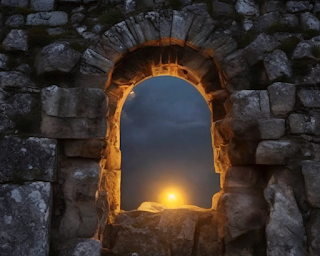Search Blog
Hit enter to search or ESC to close
Trending Now
Parshas Vayelech - The Secret Treasure of the Universe
- Get link
- X
- Other Apps
Showing posts from 2017
Posts
Parshas Vayeishev - The Wisdom of Dreams
At the very beginning of Parshas Vayeishev, Yosef is referred to as a 'Na'ar', a lad, an immature boy, in comparison to all his older brothers. And yet, we are told in the next pasuk that his father Yaakov loved him because he was a "Ben zekunim". One of the meanings of that phrase is that Yosef was sagely, he was wise in the way that the old are. How could Yosef be both young and old? How could his brothers see him as an immature boy trying to take what was rightfully theirs while his father saw him as sagely? One of the meanings of Avrech, the name that he is hailed by in Egypt, is young in years but a father in wisdom. That's still the term we use for a young married man who learns Torah in an academic setting. How could Yosef be both old and young, wise and immature at the same time? And what can we learn from him? Why did Yosef's brothers hate him so much? It was his dreams that infuriated them. And they refer to him only sourly as the ...
- Get link
- X
- Other Apps
Parshas Haazinu and Rosh Hashana: A Song and Holiday of the Future
Haazinu is one of the Torah's songs. And yet it's different from what we think of as a song. Consider the Shirat Al HaYam, the song after the splitting of the sea, or the song that King David sings in an alternate haftorah for the Parsha (if it wasn't read between Rosh Hashana and Yom Kippur) in gratitude to G-d for His salvation. Haazinu is quite different. In two ways. Rosh Hashana is different from all other Yomim Tovim, holidays, in the same two ways that Haazinu is different from the Torah's other songs. Yom Tov means, literally, a good day. And that's what holidays generally are. They are days on which we celebrate G-d's goodness, His past miracles and what they mean for our lives and our religion. Rosh Hashana is rather less celebratory. It has its holiday aspect, but it is also a time of judgment when Sifrei Chayim U'Meitim, the books of life and death are open, and when our fate for the year is determined. It is a time of feasting and celebr...
- Get link
- X
- Other Apps
Parshas Devarim - Fearlessness Through Faith
Fearlessness through faith is the theme of Devarim. G-d and Moshe repeatedly tell the Jews not to fear. Indeed the conclusion of Devarim declares, "Do not fear them, for it is the Lord G-d that fights for you." Why are the Jews repeatedly being told not to fear? Devarim begins with the failed journey from Mount Sinai to Israel. That journey is aborted by the fear of the conquest. The Jews turn on Moshe and on G-d. And they are exiled to wander in the desert for 40 years. Now the Jews are once again told to advance and conquer, without fear. Why is this generation more fit for the task than the one that left Egypt? The Parsha uses two very similar phrases. First, at Har Sinai, "You have dwelled long enough in the mountain, turn and journey..." (Devarim 1:6) Then, after wandering in the desert, "You have spent enough time circling this mountain, turn around..." (Devarim 2:3) That second mountain is Har Seir. The contrast could not be greater betw...
- Get link
- X
- Other Apps
Paradox in the Parsha - The Paradoxes of Chukas and Judaism
Parshas Chukas contains two of the most baffling questions in the Torah. One spiritual and the other logical. The most famous of these is the spiritual question and it concerns the Para Adumah, the Red Cow. The purification process of the Red Cow lifts tumaa, impurity, off a man who had come in contact with a corpse, but the Kohen who purifies him becomes impure. How can a thing which purifies also cause impurity? This is a question considered utterly baffling and deemed a decree which cannot be understood. The other question is the logical one. Why is Moshe punished in this Parsha and prevented from entering the Land of Israel? What was the nature of his offense? Both questions are really the same question. Moshe, like the Kohen, had labored on behalf of the Jews. They entered the land, he did not. Like the Kohen, he instead became "impure". Indeed G-d's indictment charges that Moshe had failed to make G-d holy in the eyes of the Jews. Lehakdisheni Leyenei Yi...
- Get link
- X
- Other Apps
The Ascending Aspirations of Chanukah and Purim
The Parsha most closely associated with Purim is Terumah and the one most associated with Chanukah is Behaloscha. The names of both Parshas refer to the ways in which we ascend when we aspire and contribute. Terumah comes from Rom. The portion that is separated is raised up as a contribution to G-d. Behaloscha likewise refers to an ascending, whether it is that of the priest rising to light the menorah or the light of the oil flame which, Rashi tells us, must be lit until the flame rises on its own. The Terumah is collected from Ish Asher Idvenu Libo, the man whose heart is moved to contribute to the construction of the Mishkan. The flame of the menorah too is only properly lit when it rises on its own. The temples of G-d are best built with offerings that are freely and joyfully given. The list of the offerings appear linear in value. Gold, silver and copper. This runs from the most precious to the less precious. The pattern continues with various fabrics dyed in colors. Turqu...
- Get link
- X
- Other Apps







